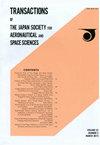考虑货运飞船发射延迟的空间站运行计划仿真与评估
IF 0.8
4区 工程技术
Q4 ENGINEERING, AEROSPACE
Transactions of the Japan Society for Aeronautical and Space Sciences
Pub Date : 2021-01-01
DOI:10.2322/tjsass.64.50
引用次数: 1
摘要
高效运行对充分发挥中国空间站的能力至关重要。确定紧急情况对空间站运行情景的随机影响对于成功实施至关重要。然而,很少有研究对空间站运行过程中的不确定性进行评估。为了填补这一空白,采用离散事件模拟(DES)方法对空间站应急作战计划进行了评估。首先,利用DES建立了空间站运行模型框架,并在综合仿真过程中引入了货运飞行器发射延迟问题。其次,利用方差缩减技术提高了结果的精度和计算效率;使用四个约束条件和三个可测量的度量来确定对模拟试验次数的相应影响。最后,将该方法应用于一个为期两年的空间站运行计划。结果表明,保持较短的发射日期和发射窗口开始之间的间隔可以减少发射延迟后的长时间。统计分析可用于确定事件日期和车辆发射日期之间的安全间隔。本文章由计算机程序翻译,如有差异,请以英文原文为准。
Simulation and Evaluation of a Space Station Operational Plan Considering Launch Delay of Cargo Vehicles
Efficient operation is important to make full use of the capabilities of China’s space station. Determining the stochastic impacts of emergencies on the operational scenario of the space station is critical for successful implementation. However, few studies have assessed the uncertainties in the operational processes of the space station. To fill this gap, discrete event simulation (DES) is used to develop an evaluation method for the contingent operational plan of a space station. First, DES is used to develop a model framework of the space station operations, and the launch delay of cargo vehicles is introduced into the integrated simulation procedure. Second, the precision of the results and the computational efficiency are improved using the variance reduction technique. The corresponding effect on the number of simulation trials is confirmed using four constraints and three measurable metrics. Finally, the proposed method is applied to a two-year space station operational plan. The results show that maintaining a short interval between the launch date of the cargo vehicles and the start of the launch windows can decrease prolonged duration after a launch delay. A statistical analysis can be used to determine a safe interval between the dates of the events and vehicle launch.
求助全文
通过发布文献求助,成功后即可免费获取论文全文。
去求助
来源期刊
CiteScore
1.80
自引率
0.00%
发文量
18
审稿时长
>12 weeks
期刊介绍:
Information not localized

 求助内容:
求助内容: 应助结果提醒方式:
应助结果提醒方式:


